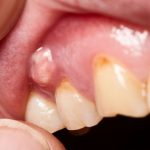Maintaining good oral hygiene can be difficult for seniors, particularly those who are partially or completely toothless. However, even without natural teeth, taking good care of your mouth is important for your overall health.
In this article, our specialists explain why oral health is particularly important for seniors.
Why is oral hygiene important, even without teeth?
Oral hygiene is an important part of staying healthy. There are many correlations between oral health and health in general.
It’s common for people to neglect their oral health as they age, particularly if they get dental implants or partial or complete dentures. However, oral hygiene is still important for people with dental prostheses. Comprehensive oral exams and panoramic x-rays can help prevent and detect serious pathologies.
Let’s take a closer look at the reasons for following our oral hygiene instructions, even for those who no longer have their teeth.
Preventing oral cancer
There is a correlation between oral cancer and poor oral hygiene. The bacteria that accumulate in the mouth can cause infections, which in turn can lead to lesions and other oral pathologies such as mouth cancer.
It’s important to maintain an oral hygiene routine and visit your dentist regularly to give yourself the best chance of avoiding these issues.
Preventing heart and lung disease
Did you know that there is a correlation between poor dental hygiene and heart and lung disease, particularly for seniors?
When the mouth is not properly cleaned, harmful oral bacteria can proliferate. For seniors who have difficulty swallowing, the bacteria can sometimes be inhaled, causing pulmonary infections such as pneumonia.
Harmful bacteria in the mouth can also cause gum infections that affect heart health. The bacteria release toxins into the bloodstream that can damage cardiac tissue, increasing the risk of heart attacks and strokes.
Reducing the risk of periodontal disease
Gum infections and periodontal disease can have other health consequences as well as increasing the risk of serious problems like heart disease. Gums hold the teeth in place, so gums that are in poor condition can cause the teeth to loosen. Once this occurs, people tend to have trouble chewing and may even lose their teeth.
Improving seniors’ quality of life
Poor oral health can often result in lower quality of life. People who neglect their oral hygiene are more likely to have poor self-esteem and limit social interaction as a result. Seniors can become isolated very easily, so it’s important to help them maintain good oral hygiene to combat this cause of isolation.
How to adapt oral hygiene routines for seniors
Oral hygiene routines for seniors are usually the same as for the general population: brushing after meals, flossing, etc. However, adaptations may need to be made for seniors who have reduced mobility or are partially or completely toothless.
Here are a few examples of changes that can be made to adapt a dental routine:
- Use an electric or dual-head toothbrush to make brushing easier for people with reduced mobility or dexterity
- Modify the toothbrush handle to make it easier to pick up and hold (make it wider or longer)
- Use a plastic floss holder to facilitate flossing
The importance of maintaining dental implants
Dental implant maintenance is just as important as good dental hygiene for natural teeth. Since implants are attached to the jawbone, they must be kept clean to maintain good periodontal health. Poorly maintained implants increase the risk of developing peri-implant mucositis that can lead to peri-implantitis (gradual bone loss).
Treating and preventing oral pathology at Clinique MFML
Maintaining good oral hygiene is important at every age. Seniors tend to have more fragile immune systems and are therefore particularly susceptible to many infections, pathologies, diseases that can be prevented by practicing good oral hygiene.
At Clinique MFML, our maxillofacial surgeons in the Greater Montreal area are committed to ensuring that all of our dental implant patients are properly informed about the importance of maintaining their implants. We help our patients understand and reduce the risks of poor oral hygiene, such as mouth cancer.
Make an appointment at our clinic in Montreal or on the South Shore to benefit from the expertise of our oral and maxillofacial health specialists.




